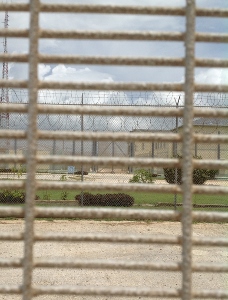Archive for September, 2013

Pastor acquitted of sex charge
 (CNS) Full story: It took a jury of four women and three men around three hours Thursday to find former youth pastor Felix Manzanares (27) not guilty of indecent assault on a 41-year-old West Bay woman. Manzanares was accused of making sexual advances towards her at her home in December 2011. Speaking for her client in her closing address, defence counsel Keva Reid had asked the jury to remember that they were "not trying him as a pastor" but they were "trying him as a human being". During the proceedings of this case, the court heard Manzanares express the feelings of humiliation the allegations had caused, as he pointed out he had lost his post as a pastor at the George Town Church of God and his role as a TV talk show host.
(CNS) Full story: It took a jury of four women and three men around three hours Thursday to find former youth pastor Felix Manzanares (27) not guilty of indecent assault on a 41-year-old West Bay woman. Manzanares was accused of making sexual advances towards her at her home in December 2011. Speaking for her client in her closing address, defence counsel Keva Reid had asked the jury to remember that they were "not trying him as a pastor" but they were "trying him as a human being". During the proceedings of this case, the court heard Manzanares express the feelings of humiliation the allegations had caused, as he pointed out he had lost his post as a pastor at the George Town Church of God and his role as a TV talk show host.
Manzanares, who is married, had admitting to kissing his accuser but had insisted that he had done so as a result of her encouragement and denied that he had fondled or groped her breast and thighs against her will.The complainant claimed that the former pastor had insisted on meeting with her on the evening of 19 December 2011 and when he arrived at her home, he grabbed the woman and tried to kiss and grope her.
While summarizing the case for the crown prosecuting counsel, Maralyn Brandt told the court that if the meeting was planned, as suggested by the accused, then the woman would not have hurried her friend to come early for their dinner plans that night. Counsel also submitted that Manzanares knew what he was doing and had a degree of premeditation to sexually assaulting her but the jury came to a unanimous decision that this was not the case.
The jury heard defence counsel state that the complainant was angered when she had heard rumours about the incident, which gave her the motive to give false statements. Counsel said that the woman was trying to defend her integrity and wanted to destroy Manzanares' life.
The courtroom was almost fully occupied and there was a wave of emotions from his friends and family as the verdict was handed down Thursday. Manzanares, who was discharged of the indictment, gave a sigh of relief before leaving the dock and walking away from the court with a clean record.

Teen arrested for Bodden Town mini-mart robbery
(CNS): A 16-year-old boy has been charged in connection with a robbery at a mini-mart in Bodden Town last May in which an elderly man was assaulted. The teenager, who was arrested on 30 August, has been charged with robbery, possession of an imitation firearm with intent to commit an offence and common assault, and is expected to appear in court tomorrow. The charges relate to a robbery at Lookout Fresh Fruit and Juices Minimart, Anton Bodden Drive, on 28 May. Police said at the time that around 4pm, a man entered the store in possession of what appeared to be a handgun and stole a quantity of cash. He assaulted the man who confronted him before leaving the location riding a bicycle along Hardy Street.
No shots were fired and no serious injuries were sustained.
The teenager is currently on police bail and it is anticipated that he will appear in court on Friday, 20 September.

Local PSA’s created on dive safety and conservation
 (CNS): Dive industry legend Dan Orr who until recently was the driving force behind the Divers Alert Network (DAN) has joined forces with local agencies to create a series of public safety video clips to help the word on watersports safety and Marine Conservation. Orr stars in the “Share Our Seas” Public Service Announcements which will be televised in the Cayman Islands this autumn. In partnership with the Cayman Islands Tourism Association (CITA) which is launching the campaign aimed at raising awareness of diver safety and conservation among residents and visitors. The on-camera star, Orr was filmed on location at Sunset House in early September where he reminds locals and visitors about basic safety in the ocean.
(CNS): Dive industry legend Dan Orr who until recently was the driving force behind the Divers Alert Network (DAN) has joined forces with local agencies to create a series of public safety video clips to help the word on watersports safety and Marine Conservation. Orr stars in the “Share Our Seas” Public Service Announcements which will be televised in the Cayman Islands this autumn. In partnership with the Cayman Islands Tourism Association (CITA) which is launching the campaign aimed at raising awareness of diver safety and conservation among residents and visitors. The on-camera star, Orr was filmed on location at Sunset House in early September where he reminds locals and visitors about basic safety in the ocean.
“The PSA’s are important because you have to continually remind divers about safety,” said Orr. “It’s important to have a regular physical, especially after 35, or any time there is a health related change in your life.”
In addition to staying physically fit for diving, Orr will be reminding divers to observe other safety measures such as having proper scuba certifications, refreshing their dive skills, getting a proper medical clearance, ensuring their dive gear is in proper condition and doing complete buddy checks.
“There’s no one even close that walks the walk that Dan does on diver safety,” said Sunset House General Manager Keith Sahm who has been Orr’s dive buddy and knows first-hand how safety conscious he is. “Dan looked at me eye to eye, and we did a complete check list – he’s a true, true buddy.”
After his departure from Divers Alert Network was announced,Sahm and his wife Karin invited Dan Orr and his wife Betty to enjoy a week of complimentary accommodations and diving at Sunset House.
“This is our way to say ‘thank-you’ to the pioneer of diver safety,” he said. “Diver’s Alert Network and DAN Insurance are vital to resorts like Sunset House. If there are any questions about whether someone is at risk diving, we can call DAN and talk to their team of medical professionals who give us good advice and take away the guess work.”
CITA said that its watersports members have long wanted to be more proactive in raising awareness of ocean safety and marine conservation among visitors and the decision was made earlier this summer to produce public service announcements. With Orr on the island for his dive vacation, Sahm, a CITA board member, saw the perfect opportunity to get the PSA’s shot. He enlisted the services of in-house videographer Tony Mark of the Cathy Church Photo Centre and asked Dan Orr to help out.
Through the PSA’s resident and visitors will also be reminded to respect the marine environment, not litter and clean up trash when they come across it. Divers will be asked to be responsible when culling lionfish and dispose of the fish properly and to stay within the 200-yard marker when swimming, use a flag when diving and snorkeling and remind those on powered watercraft to be respectful of dive flags and buoys.
CITA plans to launch the public service announcements at the Underwater Film Festival on November 13 and hopes to have them aired in theaters, on local TV and radio, plus in-house TV channels at all major hotels. CITA will also promote the PSAs through social media.

Cost of living rises reflected in price index
 (CNS): Few people living in Cayman need to be told that life is getting increasingly expensive, so the official confirmation that the Consumer Price Index (CPI) for the quarter ending June this year increased to a whopping 2.7% compared to the quarter ending June 2012 will not be a surprise. This time last year the CPI stood at just 0.9%. However, the significant jump in the index at a time which the economy is barely growing is not as a result of groceries or fuel, as many may think, but is because of the rise health insurance following the introduction of a new basic plan, the increase in education fees for non-Caymanian students and tax increases on tobacco.
(CNS): Few people living in Cayman need to be told that life is getting increasingly expensive, so the official confirmation that the Consumer Price Index (CPI) for the quarter ending June this year increased to a whopping 2.7% compared to the quarter ending June 2012 will not be a surprise. This time last year the CPI stood at just 0.9%. However, the significant jump in the index at a time which the economy is barely growing is not as a result of groceries or fuel, as many may think, but is because of the rise health insurance following the introduction of a new basic plan, the increase in education fees for non-Caymanian students and tax increases on tobacco.
In contrast, there was a decline in the price index for housing and utilities, as actual rentals were lower on average during the period compared to a year ago.
“This inflation rate is not unexpected as higher charges for items such as health insurance and tertiary education were implemented during the period,” stated Finance and Economic Development Minister Marco Archer. Health insurance premiums were adjusted upwards as a result of expanded benefits while higher tertiary education fees were charged to non-Caymanian students.
The price index for alcohol and tobacco also increased by 13.3 percent, mainly because of higher duty rates on tobacco which came into effect in September last year.
Food and non-alcoholic beverages also increased by 3.7 percent as all groups recorded price increases except for fish. The increase was led by vegetables (9.7%), fruits (8.8%), meat and meat products (4.2%), milk, cheese and egg (4.1%) and coffee, tea and cocoa (3.3%). In addition, the ESO report shows upward trends in electricity, gas and other fuels by 2.8 percent.
See full details here or for more information visit www.eso.ky.

Engineers faces major task to repair critical cable
 (CNS): Local telecommunications firm LIME has revealed that major engineering work will be required to fix the MAYA-1 Cable, which will take place in Cayman starting on Friday. The damaged part of the cable, which links the seven countries in the region, has been found to be close to Half Moon Bay and so that segment of the cable will be beached and repaired here. The cable ship Pacific Guardian (PACG) is expected shortly and work is scheduled to begin Friday through until Tuesday. Although the cable will be shut down, traffic will be routed on the Cayman-Jamaica Fibre System (CJFS) and there should be minimal interruption to local communication channels, the firm said.
(CNS): Local telecommunications firm LIME has revealed that major engineering work will be required to fix the MAYA-1 Cable, which will take place in Cayman starting on Friday. The damaged part of the cable, which links the seven countries in the region, has been found to be close to Half Moon Bay and so that segment of the cable will be beached and repaired here. The cable ship Pacific Guardian (PACG) is expected shortly and work is scheduled to begin Friday through until Tuesday. Although the cable will be shut down, traffic will be routed on the Cayman-Jamaica Fibre System (CJFS) and there should be minimal interruption to local communication channels, the firm said.
MAYA-1 is one of two submarine cable systems that provide telecommunications to the Cayman Islands. The cable connects seven countries: the United States, Mexico, Honduras, Cayman Islands, Costa Rica, Panama, and Colombia. It is owned by a consortium of 35 telecoms companies, including Cable & Wireless, AT&T, Sprint and Verizon.
LIME stated in a release Wednesday that over the last several weeks since the initial fault last month the MAYA-1 consortium and key stakeholders have been preparing to start the complex repairs. Test result showed that the location of the is fault is 145 metres off the coast of Grand Cayman at the Half Moon Bay “Beach Manhole”.
The location of the shunt fault and its close proximity to the shore requires that the segment that comes into Grand Cayman be re-landed to the beach manhole, the firm explained. “The repair operation will follow a similar plan to the original installation which took place in November 1999. The cable will be floated in from the cable ship and laid parallel to the existing cable. Extreme care will be taken to preserve coral and marine wildlife of the area, as well as designated tourist dive sites,” LIME stated.
“The cable ship Pacific Guardian (PACG) will be arriving in Grand Cayman and the work to repair the fault will commence on Friday 20th and continue until Tuesday 24th September. To facilitate the repair this segment of the MAYA-1 Cablewill be shut down for the duration of the repair period; during this time affected traffic on this segment will be routed on the Cayman Jamaica Fibre System (CJFS)," it added.
Donnie Forbes, Head of Infrastructure and Planning, Cayman Islands said LIME had been heavily involved with the logistics of this complex repair.
“We anticipate that with favourable weather conditions it will be completed in approximately 3-5 days,” he said. “Although some service degradation may be experienced we won’t have the same widespread issues we encountered with the initial fault as prior to the work commencing traffic will be rerouted to the Cayman Jamaica Fibre System (CJFS) which will ensure the majority of our customers’ services will be minimally impacted.”
LIME also noted that it had has been working with the Information and Communication Technology Authority (ICTA), the Ministry of Financial Services, Commerce and Environment, the Department of Environment, Immigration, the Police, the Port Authority, the Ministry of Home and Community Affairs and the Ministry of Planning, Lands, Agriculture, Housing and Infrastructure (PLAHI) throughout this incident and all necessary approvals have been received.

Government building still 35% empty
 (CNS): Government is still struggling to make the most out of its new office accommodation building (GOAB) as a result of the reluctance by some departments and agencies to move there and because of the costs involved in adapting the space to meet the needs of new public sector tenants. With an occupancy rate of around 65%, officials said the problems in filling the space are complex; in some cases the space is there as a result of downsizing of departments rather than the growth that had been anticipated when the building was first envisioned, but in others the space is not fit for purpose for newly proposed tenants. The issue was raised during Wednesday’s Public Accounts Committee meeting.
(CNS): Government is still struggling to make the most out of its new office accommodation building (GOAB) as a result of the reluctance by some departments and agencies to move there and because of the costs involved in adapting the space to meet the needs of new public sector tenants. With an occupancy rate of around 65%, officials said the problems in filling the space are complex; in some cases the space is there as a result of downsizing of departments rather than the growth that had been anticipated when the building was first envisioned, but in others the space is not fit for purpose for newly proposed tenants. The issue was raised during Wednesday’s Public Accounts Committee meeting.
Members asked Deputy Governor Franz Manderson and Alan Jones, chief officer in the ministry with responsibility for the government office accommodation building, whether there had been any improvements in occupancy rates since the auditor general made his report on major public projects using the GOAB as one of his case studies. In that report Alastair Swarbrick had reported that the building was only 60% full.
While officials revealed there had been a marginal improvement to about 65%, Manderson described the issue of getting public authorities in there as ‘tough decisions’, which, he said, the government was continuing to make to have tenants come in. He said that the Department of Tourism was about to make the move but there were issues preventing the relocation of some government agencies, many of which remain scattered around in various commercial office buildings.
Alan Jones explained the problems with occupancy. He said that when the building was designed, chief officers were looking at future growth as it was important to build a building that would take into account potential staff numbers. However, in many cases the entities that had moved in are, in fact, smaller than had been expected due to cuts, so they now have excess space. But these are bits of space in department which are not big enough necessarily to accommodate a full public authority.
Around a quarter of the original tenants had pulled out, such as the Cayman Islands Monetary Authority, which was advised by international regulators not to share accommodation with government as because of the need for independence. Jones explained that where this had happened, the space that had been designed was not necessarily appropriate for other entities. In order to move new public sector tenants into the building, which has already cut costs for those in there, there will need to be physical changes made.
He also noted that it was “all too easy” for public authorities to make a case for not moving into the building.
“Strong efforts are being made to bring in other entities but this is not helped with government's financial position, as changing fitted out space is expensive and money is tight,” he said, adding that it was still government’s intention to press ahead with getting the building fully occupied as soon as possible.
During the PAC proceedings both Opposition Leader McKeeva Bush and the UDP opposition MLA Capt Eugene Ebanks queried why, when he was the main critic of the empty space, the auditor general had his office in Anderson Square, triggering a number of direct criticisms of Swarbrick from Bush during the course of the meeting.
The auditor pointed out that, because the Office of the Auditor General had to be independent from government, it was not appropriate for his physical office to be in the central government location.
“It would be against best practice and the practices of independent audit for my office to be in the same building as the entities we audit,” he said, adding that nowhere in the developedworld would a public auditor share an office with the government. He said the possibility of his office sharing with the information commissioner and the complaints commissioner, who are also independent entities, to cut costs was being discussed. But he emphasised that the OAG could not share space with core government.
Bush disagreed and said his office was exactly the department to be pushed in a back office somewhere as the public didn’t need to visit, a point Swarbrick disagreed with. He said that quite to the contrary, members of the public do come and also report things to him — something that would be far less likely to happen if the office was in the GOAB at the heart of government.

Procurement office in works
 (CNS): The deputy governor has said a new government department is being created to address issues relating to major public capital projects and procurement, based on recommendations made by the auditor general in his report about how government currently manages these projects and the public cash spent on them. Franz Manderson told the Public Accounts Committee (PAC) Wednesday that this new government entity will address most of the problems identified and fulfill the auditor’s recommendations. Some $350,000 has been budgeted for the office, which will deal with everything from developing new laws to establishing business cases for public projects.
(CNS): The deputy governor has said a new government department is being created to address issues relating to major public capital projects and procurement, based on recommendations made by the auditor general in his report about how government currently manages these projects and the public cash spent on them. Franz Manderson told the Public Accounts Committee (PAC) Wednesday that this new government entity will address most of the problems identified and fulfill the auditor’s recommendations. Some $350,000 has been budgeted for the office, which will deal with everything from developing new laws to establishing business cases for public projects.
Answering questions from the PAC about a report by Alsastair Swarbrick which had raised numerous concerns over how government has, until now, managed major projects and procurement, Manderson explained the creation of the new office. The Office of the Auditor General (OAG), which used the tendering process for the high schools and the entire Government Administration Building Project as case studies for its report, found significant weaknesses with leadership and oversight. In response, the deputy governor said a working group had been established to examine the findings and address the recommendations.
That work, Manderson said, was now almost complete, and after a report had been submitted to Cabinet about addressing procurement weaknesses, he had been given the go-ahead to establish the new Central Procurement Office (CPO) and begin the recruitment process for a procurement director.
The office will be responsible for standards, procedures and have oversight of the procurement process. It will also begin work on drafting new legislation, removing procurement from the existing Public Management and Finance Law and creating a new and separate law.
The deputy governor told the PAC that the future goal in managing projects would be to get things right from the start, and it will be this office that will establish the business case for any project before it goes to tender.
The office will also include the Central Tenders Committee, which will be renamed the Procurement Committee. It will be have a member of the private sector as its chair but government and the opposition will both be asked to make appointments as well as the deputy governor’s office. One member of the Standards in Public Life Committee will also sit on the procurement board. Manderson explained that it will be mandatory for any government project of $250,000 or more to be handled by the new committee.
Following the PAC meeting, Peter Gough, the strategic advisor to the deputy governor, outlined the plans for the office in an email to CNS. He said that once created, the CPO will be responsible for “establishing procurement laws and regulations, policies and procedures, developing and maintaining standard government procurement documentation, procurement oversight, carrying out some centralized procurement, advising government entities on procurement and training of employees involved in procurement.”
Cabinet has allocated funds for the new post of director of the central procurement office in the 2013/14 Budget. The CPO will employ three people with an annual budget of about $350,000, and Gough said the director would be the first appointment.
“A draft Job Description has been developed for the Director of Central Procurement and once the grade has been evaluated it will be advertised,” Gough confirmed.
From developing and maintaining laws, regulations, policies and procedures for procurement to be used by all government entities to establishing the business case templates, as well as advising on and approving procurement strategies on significant projects starting from $50,000, the office will be expected to train all government employees who are or will be involved in procurement.
The office will also stick with public projects as they roll out and undertake post implementation reviews to ensure that they have achieved the objectives of the business case and are within financial and time limits.

Mac faces probe over limos
 (CNS): Police have confirmed that the Financial Crimes Unit is pursuing yet another investigation that involves the former premier, this one regarding the misuse of public funds to finance limo services in the United States. The RCIPS issued a short statement Wednesday following enquiries by CNS and revealed that McKeeva Bush, now the opposition leader, attended the police station regarding the latest investigation on Tuesday but he had not been arrested. Asked about the latest probe, Bush said he had done nothing wrong and he had told police the car services used in his role as premier when visiting the US were organised by staff and followed a protocol that had been in place for many years.
(CNS): Police have confirmed that the Financial Crimes Unit is pursuing yet another investigation that involves the former premier, this one regarding the misuse of public funds to finance limo services in the United States. The RCIPS issued a short statement Wednesday following enquiries by CNS and revealed that McKeeva Bush, now the opposition leader, attended the police station regarding the latest investigation on Tuesday but he had not been arrested. Asked about the latest probe, Bush said he had done nothing wrong and he had told police the car services used in his role as premier when visiting the US were organised by staff and followed a protocol that had been in place for many years.
“Car services have always been provided by staff in the US since the 1990s, and both security and car services were made available for the premier both here and overseas by the protocol office,” he said. “The police asked me about cars but I don’t know what is paid to which companies for them; I was merely provided with the cars when needed.” Bush noted that it was an historic provision and he had no idea who owned the companies involved.
The opposition and UDP leader told CNS that he believed this was just more of the “vindictive witch hunt” against him “to make my life hell and to make me look as bad as possible”, but he saidhe was grateful that there were people who knew the truth of it all.
The RCIPS gave limited information regarding the issue but other sources suggested that allegations had been made that cars were being used for non-government business and the firm used was owned by employees in Cayman’s Florida office, who were also responsible for procuring the necessary limousine services for any visiting Cayman Islands officials, including the premier.
Police said that they were in a position to confirm that Bush had attended at the RCIPS Financial Crime Unit on Tuesday, 17 September, by appointment.
“Mr Bush was not arrested,” the police emphasised. “He was interviewed in connection with the alleged misuse of public funds to finance limousine services provided by a company owned by an employee of the Cayman Islands Office in Miami. Enquiries are at an early stage and as such it would be inappropriate to comment further," an RCIPS spokesperson stated.
Bush is currently facing several corruption related charges over the alleged misuse of a government credit card, but earlier charges of theft have been dropped. He appeared in Grand Court last Friday when the trial, which is expected to last four weeks, was scheduled for next September.

Booze and drugs litter prison compound
 (CNS): Prison authorities have recovered well over two pounds of ganja over the last fewdays, which they suspect was lobbed into theprison compound over the two 15-foot fences that surround the facility. According to officials, a number of packages of contraband were found at HMP Northward this morning, yesterday morning and over the weekend. The package found today, Wednesday 18 September, contained two plastic bottles filled with white rum, as well as a parcel of almost nine ounces of what the prison described as vegetable matter but is understood to be ganja. These were found in an old paint can located near the tilapia fish tank at the rear of the prison.
(CNS): Prison authorities have recovered well over two pounds of ganja over the last fewdays, which they suspect was lobbed into theprison compound over the two 15-foot fences that surround the facility. According to officials, a number of packages of contraband were found at HMP Northward this morning, yesterday morning and over the weekend. The package found today, Wednesday 18 September, contained two plastic bottles filled with white rum, as well as a parcel of almost nine ounces of what the prison described as vegetable matter but is understood to be ganja. These were found in an old paint can located near the tilapia fish tank at the rear of the prison.
Yesterday a package containing ganja, which was wrapped in duct tape and weighed over one pound, was said to have been discovered near the grow-box area, where it had landed after it was apparently thrown over the prison fence. At the weekend officials seized two similar packages totalling almost 12 ounces of what was believed to be ganja that had been found around the prison.
After a history of the prison authorities turning a blind eye to the ganja use by inmates, as documented in a recent prison report that described very high levels of illegal drug use in Northward, the new prison director, Neil Lavis, has adopted a zero-tolerance policy. As a result, officers have found and confiscated considerably more contraband over the last few months than has ever been previously reported, including cell phones, smoking papers, alcohol and ganja. All of these finds were on the compound or in the process of being smuggled into the prison by inmates, the authorities said.
The prison also claims that drug counselling is available to all inmates but it is understood that it is nowhere near the standard required and, despite the levels of addiction among prisoners, few of them are using the services.
The UK prison inspectorate’s report published last year found high numbers of prisoners arrived at Northward with either drug or alcohol problems and its survey showed that a further 13% developed a problem while in prison.
“In spite of this, there was no provision for prisoners with drug or alcohol misuse issues to receive clinical treatment,” the inspectors said. “In our survey, 24% of men had had a problem with drugs and 13% with alcohol on arrival at Northward, and a further 13% said that they had developed a problem with illegal drugs while at the establishment. In spite of these statistics, there was no provision for prisoners with drug or alcohol misuse issues to receive immediate, safe, effective and individualised clinical treatment,” the report stated. In addition, less than a quarter of inmates said they knew who to ask about help with drug dependency issues
The prison works on a regime of punishment, and although addiction is an illness, those found with contraband lose sentence remission time and other privileges but are still not properly treated for their drug dependency. In many cases, the report also found that some prisoners misusing drugs were also suffering from undiagnosed and untreated mental health problems.
The inspectorate found that little effort was made to control the smuggling of contraband into the prison, but the authorities have noted the particular problems they face with drugs being thrown over the fences.
Although the perimeter fences are covered by CCTV, the cameras are not monitored in real time as government officials have stated that the prison does not have the budget to cover the necessary staffing levels. However, it is recording the packages illegal arrival and can assist in the prosecution of those that are apprehended. Members of the public who commit such offences are subject to criminal prosecution.
With the increased vigilance by officers, who are now finding drugs on the prison grounds with increasing regularity, the director commended his staff for the success in “the battle against the small minority who try and supply contraband” to the prison population.
“I would also urge those individuals to think long and hard about their actions. Drugs and alcohol work against our efforts to stabilise the population, work with them to be clean from drug and alcohol use, and thereby returning them to society to lead law abiding lives,” Lavis added.

Parents urged to keep lunchbox meals safe
 (CNS): The Department of Environmental Health (DEH) is reminding parents of the importance of following good food-safety practices when preparing children’s school lunches. “It is important to keep our children safe from food-borne illnesses by following the recommended safety guidelines” said DEH Food Safety Officer, Gideon Simms. DEH officials ask parents to follow thee tips below in order to prevent children from acquiring food-borne illnesses. For more information on food safety, please contact the DEH at 949-6696.
(CNS): The Department of Environmental Health (DEH) is reminding parents of the importance of following good food-safety practices when preparing children’s school lunches. “It is important to keep our children safe from food-borne illnesses by following the recommended safety guidelines” said DEH Food Safety Officer, Gideon Simms. DEH officials ask parents to follow thee tips below in order to prevent children from acquiring food-borne illnesses. For more information on food safety, please contact the DEH at 949-6696.
At Home:
- Keep the kitchen’s food-preparation areas clean.
- Wash your hands with antibacterial soap and warm water before handling food.
- Clean your cutting boards, dishes, utensils and countertops with hot water, and a sanitizer or antibacterial soap.
- Don’t let pets jump up on kitchen counters.
- After making lunch, return perishable foods (like cheese, deli meats and mayonnaise) to your refrigerator promptly. Don't let them sit out on the counter.
The Lunchbox:
- Pack lunch in the morning, not the night before. Make sure that cold foods are cold before packing them in a lunchbox.
- Insulated lunchboxes are the best way to keep food at a safe temperature until it’s time to eat. Sandwiches made with refrigerated items such as luncheon meats, cheese and tuna salad should be carried in an insulated lunch bag with an ice pack. This will keep the sandwiches safe to eat, even after two to three hours outside of a refrigerator.
- Pack a frozen juice box or an ice pack in the lunchbox, to help cold food stay cold.
- Keep hot foods hot, like soups, stews or chilies. In the morning, bring food to a boil and then pour it into a hot, clean vacuum bottle (you can disinfect the vacuum bottle with boiling water).
At School:
- Instruct kids to store their lunchboxes in a cool place, out of direct sunlight.
- Place dairy products such as milk and yogurt into a refrigerator.
- Instruct kids to always wash their hands before eating.
- Never eat food that has a funny taste or smell.
- Use food within their recommended “use-by” dates.
Lunch foods that can be eaten at room temperature include the following:
- Peanut butter
- Jams and jellies
- Breads, crackers, cereals
- Clean fruits and vegetables
- Dried meats, such as beef jerky
- Baked products, such as cookies and cakes
- Canned meat or poultry products that are eaten immediately after opening.